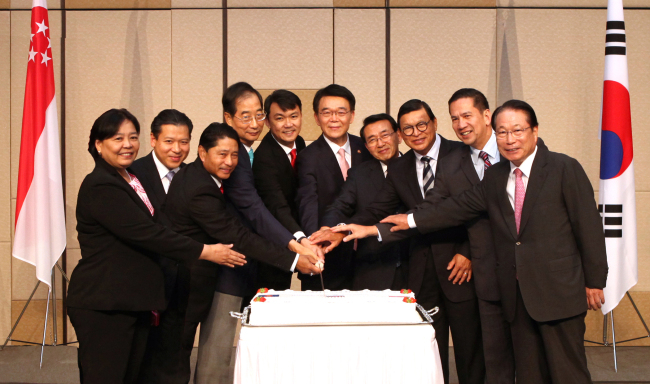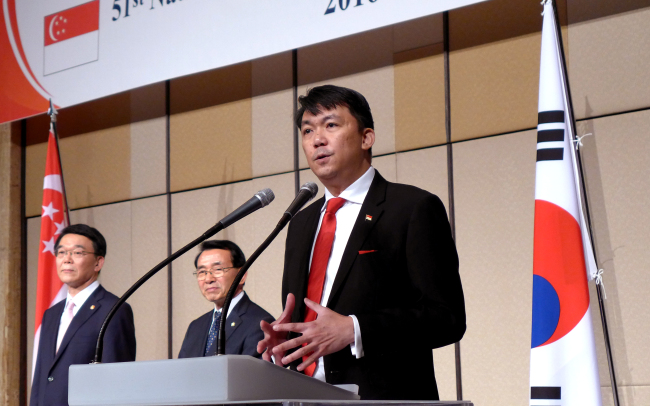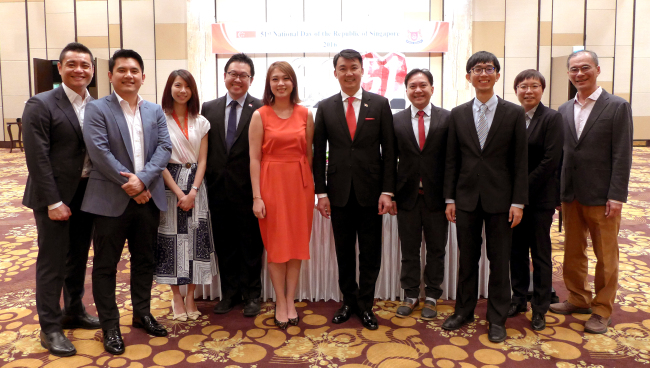Over the last few years, Singapore has navigated through a rough sea of global financial unpredictability, making structural reforms to secure its footing.
The small island state at the foot of Malaysia, acclaimed for international competitiveness and openness, is moving past nearly six decades of guidance under national founder Lee Kuan Yew, who passed away last year in March. Amid the uncertainties of low growth in economy and population, it is searching for innovative solutions to ensure the prosperity and unity of the next 50 years.
The Singaporean Embassy held a reception last week to commemorate the 51th anniversary of independence and the 41st anniversary of diplomacy with Korea.
 |
Singaporean Ambassador Yip Wei Kiat (fifth from left) poses with envoys from Southeast Asia and dignitaries including Korean Minister of Land, Infrastructure and Transport Kang Ho-in (fifth from right). (Singaporean Embassy) |
“Last year we celebrated two milestones of the 50th anniversary of Singapore’s independence and 40th anniversary of diplomatic relations with Korea,” Singaporean Ambassador Yip Wei Kiat said at the ceremony in Seoul on Wednesday.
“This year has not been an easy one for Singapore. Like Korea, we are an open economy that depends heavily on the healthy growth of our markets around the world. The difficult task of making necessary structural reforms becomes easier when we seek out new opportunities through economic partnerships.”
Highlighting that Singapore was the second-largest foreign investor in Korea last year, the ambassador added “this reflects our confidence in the resilience of the Korean economy.”
GS Engineering and Construction won a $1.46 billion contract in March to build the world’s largest vehicle depot in Singapore and Hyundai Engineering and Construction set up a joint research center in Singapore in January with Nanyang Technological University.
As the first undertaking by a Korean construction conglomerate to establish a research center outside of Korea, the NTU-Hyundai Urban System Center will conduct state-of-the-art research aimed at creative solutions in underground space use, seawater desalination and construction methods.
 |
Singaporean Ambassador Yip Wei Kiat (right) speaks at the Independence Day reception in Seoul on Wednesday (Joel Lee / The Korea Herald) |
Another area of strong growth has been academic exchange, noted the envoy, adding Singapore is one of the largest sources of foreign students who attend summer programs across Korean universities every year. Nanyang Technological University in Singapore signed a memorandum of understanding with Korea Foundation in April to jointly establish a professorship in Korean studies.
“Singapore today has emerged as a global center of finance, trade and tourism beyond Asia,” said Korean Minister of Land, Infrastructure and Transport Kang Ho-in. “Singapore’s commitment to transparent investment climate, preservation of nature and bold investment in people, on the back of the government’s future-oriented leadership, has led the country to its current standing.”
Singapore was the second economy that Korea signed a free trade agreement with in 2006. Over the last five years, bilateral trade has surged at over 10 percent annually. Singaporean investment in Korea reached $1.7 billion in 2014.
The global city state — dubbed the “Lion City,” the “Garden City” or the “Red Dot” — is one of the most preferred destinations for Korean travelers, with 530,000 visiting in 2014.
As the world’s second-largest market for Korean construction firms after the Middle East, contracts worth $38 billion were secured as of June, according to Kang. Korean companies have won contracts in four out of thirteen projects for metro construction in Singapore.
By Joel Lee (
joel@heraldcorp.com)
 |
Singaporean embassy staffs and represenatives of various agencies (Joel Lee / The Korea Herald) |










![[Today’s K-pop] Blackpink’s Jennie, Lisa invited to Coachella as solo acts](http://res.heraldm.com/phpwas/restmb_idxmake.php?idx=644&simg=/content/image/2024/11/21/20241121050099_0.jpg)